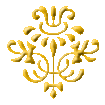Contemplating Babel
Just try to imagine a tower built not of bricks but instead of letters of the alphabet combined in words, or mortared and fired, like bricks, to make a building - then go on imagining them placed one on top of another, bonded, supporting one another, feeding one another, and you will see that they will aim towards an apex, an extreme summit, which will no longer be a mere word, but will strive to become a name it is a very up-to-date situation: visibility and power.
Actually Bavel in Hebrew (written Bet-Bet-Lamed) comes from the verb Balal (written Bet-Lamed-Lamed), to confound, and has a rather arrogant intention: to give oneself a name visible from all over the world. That is what the literal reading of the biblical passage of Genesis 11, verse 1 gives us: «Now, all the earth had a single language and the same words»; and verse 3: «And they said to one another: Come, let us make bricks and fire them! They used brick instead of stone and tar instead of mortar». And verse 4: «Come, let us build a city and a tower that will reach to the sky, and let us make a name for ourselves, so as to not be lost all over the surface of the world!».
If you want to translate for everybody - I mean be understood without multiplying the words of your text with footnotes - you pass over, you straddle, you ignore these details, and build a tower of Babel in bricks and mortar for your reader seeking poetic or epic, ethical or merely fascinating images. That is what King James and Saint Jerome did; you cannot bypass the rules of the mass-media show.
But if the Torah were merely a book of words it would be nothing but a tower of Babel - and that is so true that when you read it in its original language, you soon discover that its first and last letters are precisely those of the name Bavel: Bet and Lamed.
Actually, mankind that came before the building of the tower is an entirely positive mankind, bonded by the absolute capacity to communicate (verse 1), and is a community where the common language, logically, can have become once again Adam's, in which the name is that which gives life to things (Genesis 2.19: «The Lord God brought all the things He had created to Adam, and Adam called them by their names»), while all things derive and are created by the one name, which is God's, and is the matrix of and the key to all material things, rather like a sort of supreme NDA of raw matter. To make for oneself, or better said "fabricate a name for oneself", in that context, can also be interpreted as meaning something like to genetically manipulate nature, imposing new dynamics, new laws, which start at the bottom, while tending upwards. Consequently, God comes down to restore a condition of order, beginning with destruction (the flood, Ge. 6) and continuing with the confusion of Bavel. Rashi of Troyes, in his commentary to Genesis 11, writes: One asks for a brick, and the other hands him the mortar; the first falls upon the other and cracks his skull; the confusion is not in the words or the language, but in their meaning. In a way, every war or massacre that took place in the course of history is no less grotesque, after all, than the image given by the two workmen of the tower, according to Rashi's explanation.
Now, to fully understand that tower of letters of the alphabet mortared and fired like bricks, you should know that when mankind before the dispersion of Babel had become so degenerated as to be destroyed by God with the flood, the selection and election that God accomplished through Noah implied the building of an Ark, and that to execute it God imposed exact indications concerning materials and, above all, measurements, even specifying: «You will make an Ark (Tevah) with a first floor, a middle floor and a top floor» (layers of consciousness?) (Ge. 6:16). When the word tevah was translated, the word Ark was chosen because it floats, it is a closed, secret container intended for a transport (arcane), even though the word tevah in Hebrew mainly means: "word, lexeme"... So God tells Noah to build himself a "word" having such and such measurements, precise materials, forms and structures, and in it to gather the forms of life, according to their natural, earthly duality. But someone translating in order to be understood would have a hard time making animals and men float upon a "word"...
And yet that Adam who, alone among all creatures, had the word to express himself to the world, and who thus gave all things their name, that same earthly Adam turned out however, amidst that all, to be alone and to not desire to live, so he needed woman. Thus it is precisely Adam who before being given Eve shows us the most present, profound, and paradoxical meaning of Babel: «It is impossible for man to live in solitude» (Gen.2:18), God says before dividing the female from the male one, because any finite entity, closed upon itself, is a being that cannot survive. It is thus for the mankind of Babel: seeking unity in homologation (of customs, of languages), it builds such an impossible world that it leads to destruction, returns to chaos. But in the nostalgia of exile, in endeavouring to recompose itself, it achieves the slow, hidden or perhaps arcane act of love.
Claudio Ronco

|
|